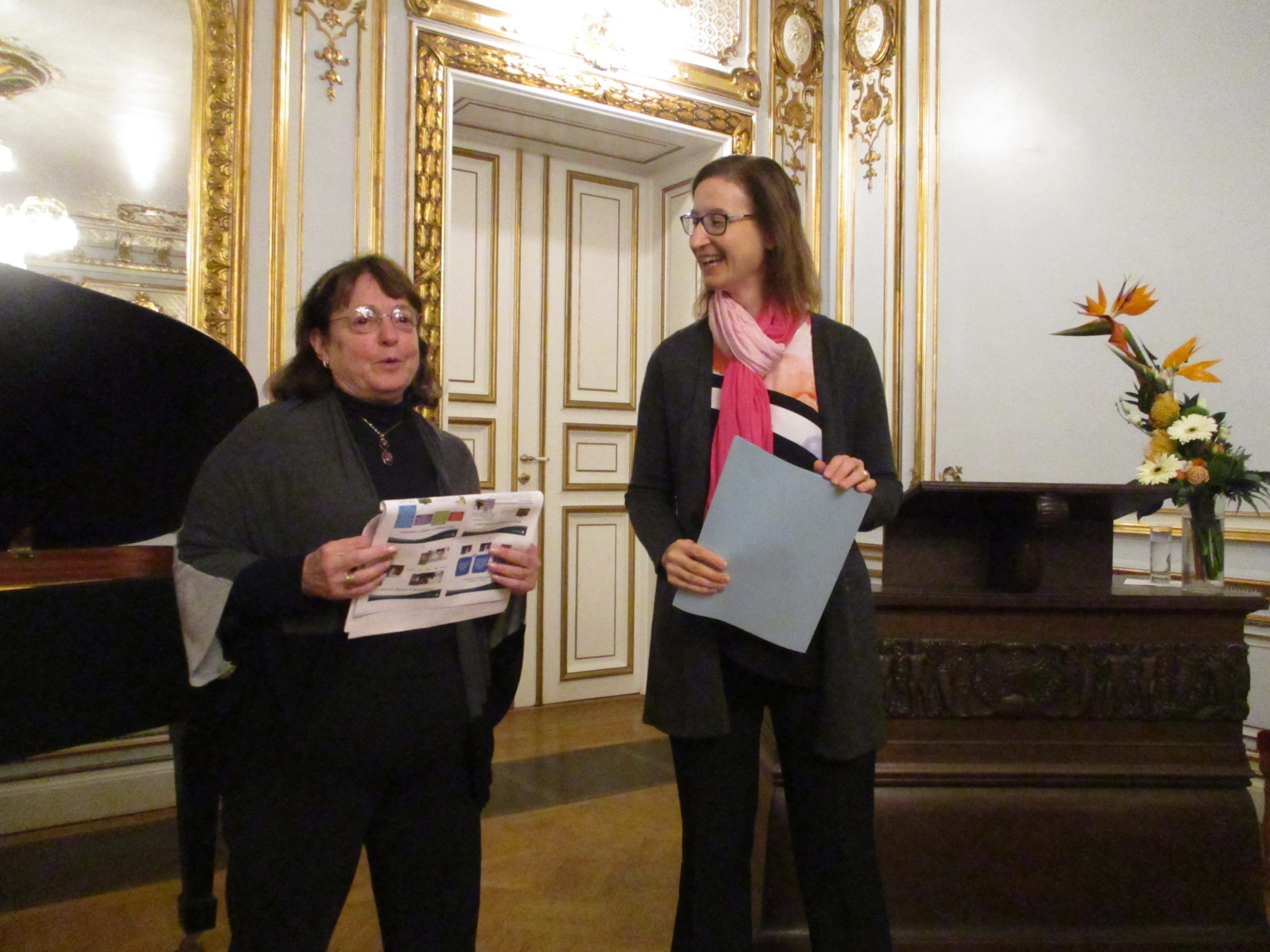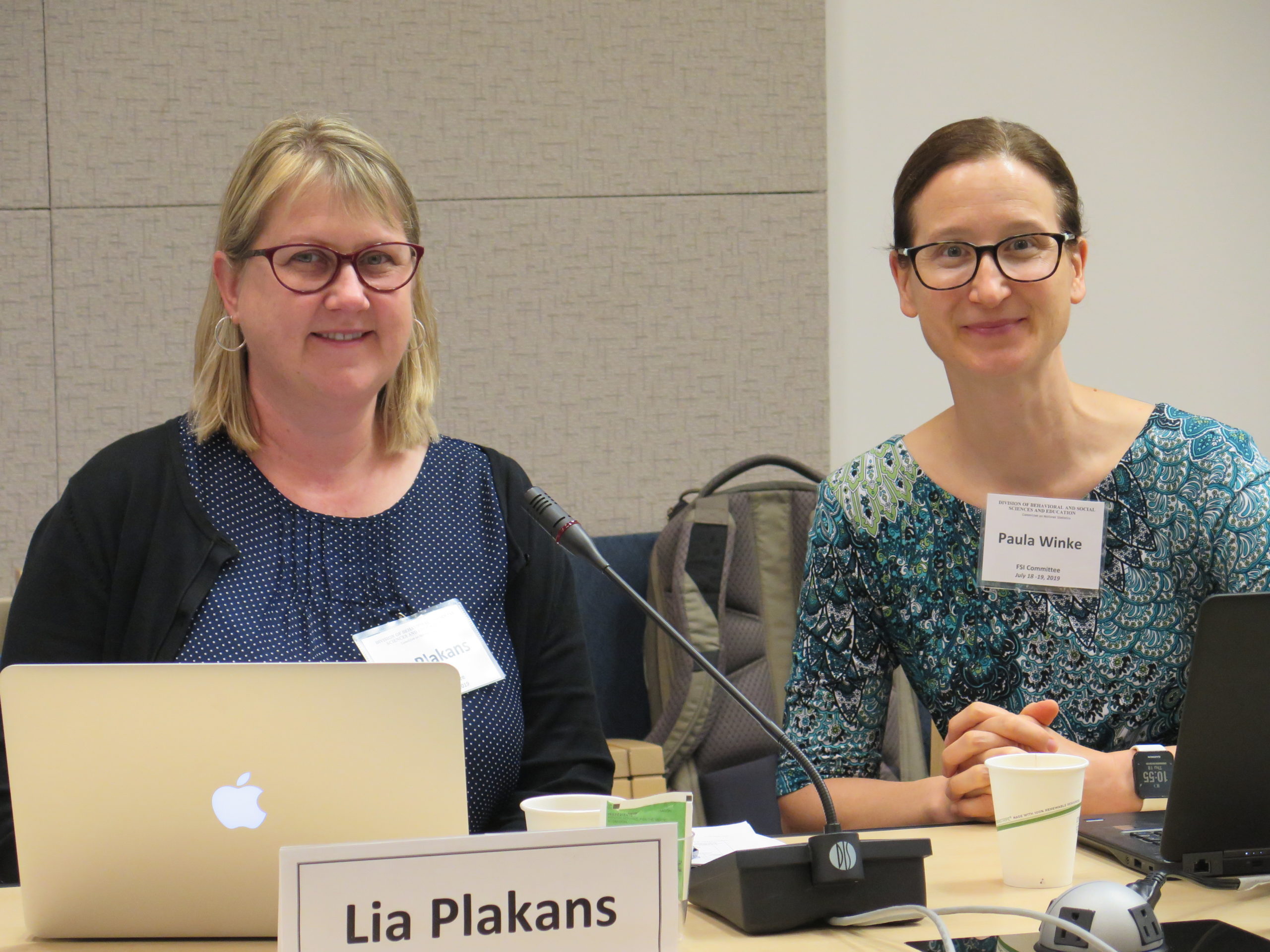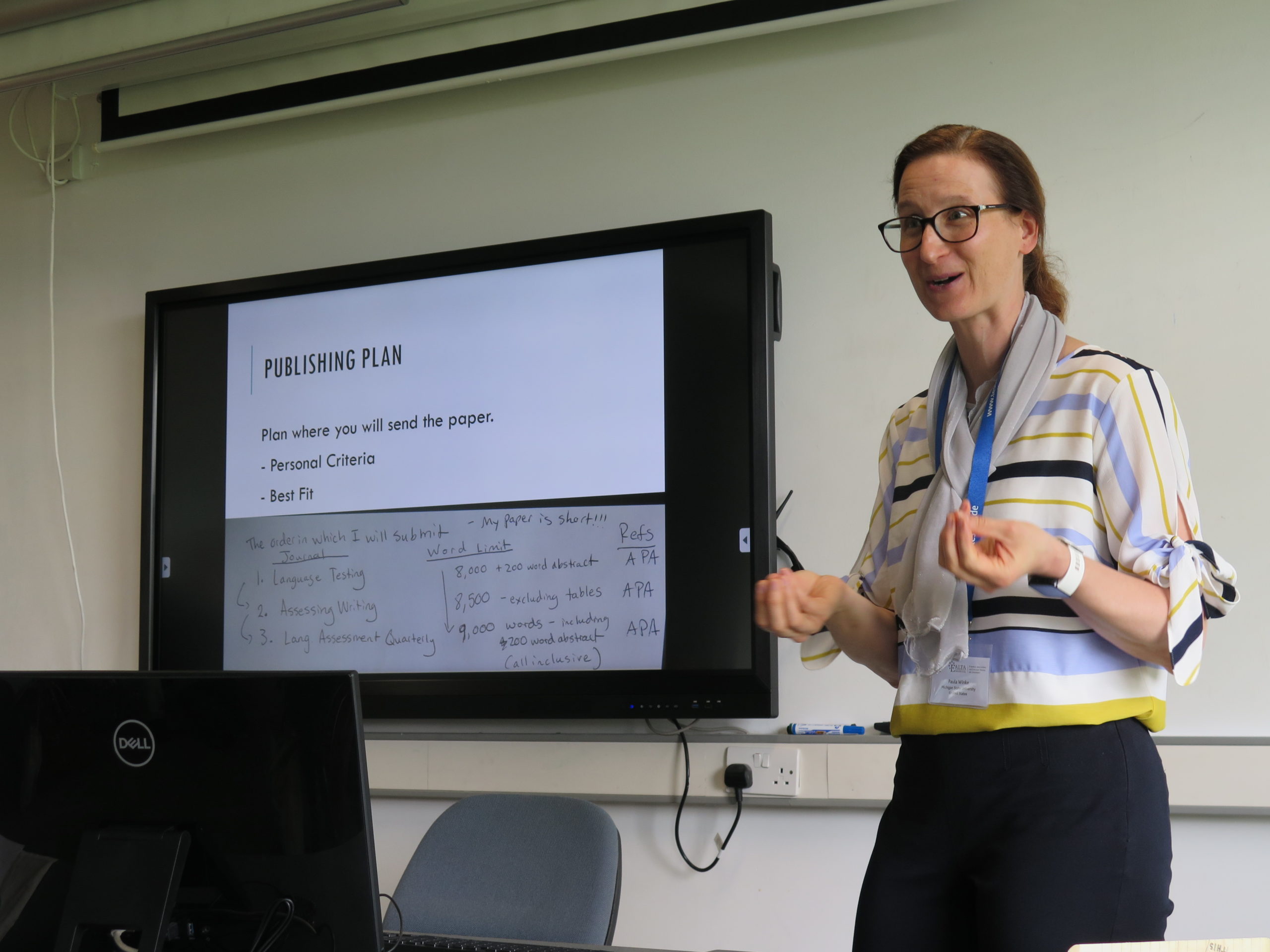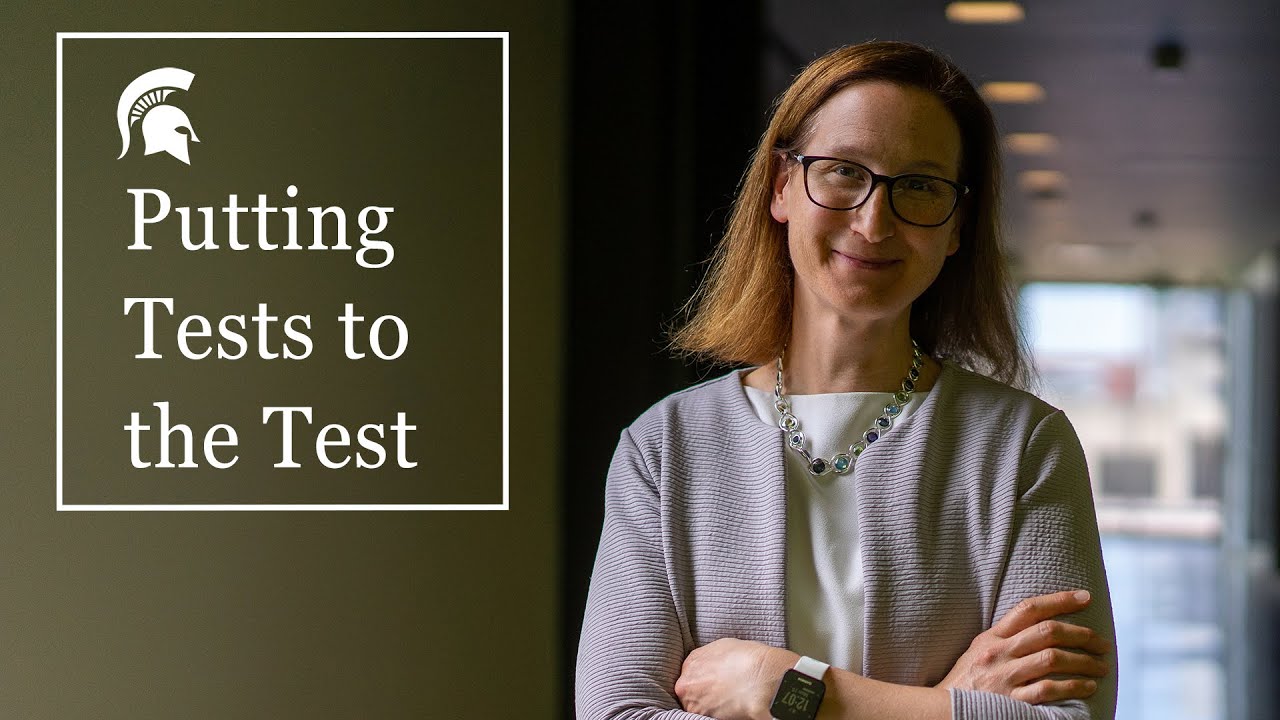Paula Winke
winke@msu.edu
(517) 353-9792
B252 Wells Hall
619 Red Cedar Rd
East Lansing, MI 48824
FacultyLinguistics, Languages, and CulturesSecond Language Studies
Arts & Letters Professor
Applied Linguistics Program
Second Language Studies Ph.D. Program & MA TESOL & Applied Linguistics Program
Biography
(Ph.D, Georgetown University) Paula Winke is the Inaugural Arts & Letters Professor in the College of Arts & Letters. She teaches in the Second Language Studies Ph.D. Program and in the TESOL & Applied Linguistics Programs in the Department of Linguistics, Languages, and Cultures. Her primary research is on foreign and second language assessment and individual differences that affect assessment processes and outcomes. Paula is currently on sabbatical at the Universität Innsbruck (Austria), within the Institut für Fachdidaktik (Department of Specialized Instruction), and within the Language Testing Research Group Innsbruck (LTRGI).
Media Mentions
Innovations in Less Commonly Taught Languages: A Conversation with Kadidja Koné and Paula Winke
Voices from LLT Podcast
March 8, 2025
In this episode of "Voices from LLT Language Learning and Technologies" podcast, special guests Kadidja Koné and Paula Winke discuss their recent work editing a special issue focused on the role of technology in learning and teaching LCTLs.
Scholars see dangerous precedent in West Virginia U’s pan to cut foreign languages
The Chronicle of Higher Education
August 18, 2023
Winke and other linguists and world-languages scholars spoke out against West Virginia University’s elimination of its Department of World Languages, Literatures, and Linguistics.
The Hardest Questions on the US Citizenship Test
News Break
March 20, 2022
Paula Winke’s research contributes to a national list of the hardest questions on the U.S. Civic examination.
How Captions in TikTok Videos and Dictionary.com Are Remaking Internet Culture and How We Literally Talk About Disability in Tech
Forbes Online
March 7, 2022
Subtitles and captions in videos help people comprehend as part of multimodal intake.
Why captions are everywhere on TikTok: ‘Glasses for your ears’
Los Angeles Times
September 23, 2021
Paula Winke, a Michigan State University linguistics professor who has researched the educational benefits of captioning, described captions as “glasses for your ears” that can make it easier to parse dialogue.
The Case for Abolishing the Citizenship Exam
SLATE
November 26, 2020
But, as Michigan State University professor Paula Winke argues, even for those who do pass, the test only measures how well they have mastered the study guides, not how well they know their history or their rights.
Quiz: Can You Answer the Hardest Citizenship Test Questions?
New York Times
July 3, 2019
Citizenship officials have not made public how they determine which questions are hardest. “Perhaps the greatest problem with the civics test is that it is possible that not everyone takes an equally difficult test,” Dr. Winke wrote in the study.
What does the US citizenship exam actually test?
Public Radio International, The World
October 15, 2013
Winke’s premise was that, before immigrants study for the test, they should get the questions wrong that US citizens would naturally get right. “I think we’ve got ten items that are working really well and 90 that are not,” Winke said.
Awards and Honors
International Language Testing Association (ILTA) Best Article Award
International Language Testing Association
2025
The award is for the article that makes the most significant contribution to the field of language testing in a given calendar year. In June 2025 at the ILTA Language Testing Research Colloquium (LTRC), the award for 2023 goes to Paula Winke, Xiaowan Zhang, & Steven Pierce for their Open Access article on self-assesssments in language learning (https://doi.org/10.1017/S0272263122000079).
Leopold-Franzens-University of Innsbruck Guest Professorship
University of Innsbruck
2024-2025
Visiting Scholar at the University of Innsbruck 2024-2025, with award of a Leopold-Franzens-University of Innsbruck Guest Professorship in Summer 2025
Arts and Letters Professorship
College of Arts and Letters, Michigan State University
2022
Paula Winke holds the College of Arts and Letters’ inaugural Arts and Letters Professorship. Arts & Letters Professors are recognized for their significant experience and accomplishments in their fields. https://cal.msu.edu/faculty/arts-letters-professorships/
Fulbright Scholar
Fulbright Germany
2022
Fulbright Scholarship to conduct research at the University of Leipzig, Leipzig, Germany, with faculty host Dr. Erwin Tschirner, April through July.
The ACTFL-NFMLTA/MLJ Paul Pimsleur Award for Research in World Language Education
American Council on the Teaching of Foreign Languages, the National Federation of Modern Language Teaching Associations, and the Modern Language Journal
2021
Created in 1977 as a memorial to Paul Pimsleur, this award recognizes his contributions to the profession as an outstanding teacher, researcher, and expert on test creation and interpretation. Recipients of the Pimsleur Award shall be the authors of an outstanding contribution to research in world language or second language education.
American Association of Applied Linguistics (AAAL) Research Article of the Year Award
American Association of Applied Linguistics
2020
Research Article of the Year Award for “The cognitive validity of child English language tests: What young language learners and their native‐speaking peers can reveal,” published in TESOL Quarterly with graduate student coauthors Lee, Yoon, Ahn, Choi, & Cui. https://doi.org/10.1002/tesq.396
TESOL Award for Distinguished Research
TESOL International
2012
The International TESOL Award for Distinguished Research recognize excellence in research on language teaching and learning. The annual award is given for empirical research that advances English language teaching policies, programs, or practices, or generates new knowledge about additional language acquisition.
Outstanding Article of the Year Award
Computer-Assisted Language Instruction Consortium (CALICO)
2009
Research Article of the Year Award for “Did we forget someone? Students’ computer access and literacy for CALL” published in the CALICO Journal with Senta Goertler. https://www.jstor.org/stable/calicojournal.25.3.482
Fulbright Scholarship
Fulbright Hungary
2008
Fulbright Scholarship to conduct research and teach at the Budapest University of Technology and Economics, Budapest, Hungary, January through July.
Publications
Burton, J. D., & Winke, P. (2025). Affect as a component of second language speech perception. Studies in Second Language Acquisition. Advance online publication. 1-26. https://doi.org/10.1017/S0272263125000063
Winke, P., & Koné, K. (2025). Why we need more research on technology applications in less-commonly-taught-language (LCTL) programs. Language Learning & Technology, 29(2). 1-10. https://doi.org/10125/73608
Etchart, M., & Winke, P. (2024). Reexamining the “L2 Grit Scale” construction process: A conceptual replication of Teimouri, Plonsky, and Tabandeh (2022). Journal for the Psychology of Language Learning, 6(2), Article e6216324. https://doi.org/10.52598/jpll/6/2/1
Zhang, X., & Winke, P. (2024). Time to proficiency in young English learners and factors that affect progress. TESOL Quarterly. Advance online publication. https://doi.org/10.1002/tesq.3340
Koné, K., & Winke, P. (2023). Do directed motivational current phenomena exist everywhere? An investigation into African EFL learners’ experiences. English Language Teaching, 16(4), 1-14. https://doi.org/10.5539/elt.v16n4p1
Siddoqui, T., & Winke, P. (2023). Bangladeshi EAP teachers’ perspectives on Task-based Language Teaching. TASK, 3(2), 273-304. https://doi.org/10.1075/task.00023.sid
Winke, P., Zhang, X., & Pierce, S. J. (2023). A closer look at a marginalized test method: Self-assessment as a measure of speaking proficiency. Studies in Second Language Acquisition, 45(2), 416-441. https://doi.org/10.1017/S0272263122000079
Winke, P., Huntley, L., & Gass, S. (2022). “So I think دبة is bear!” An initial data-driven explanation of how Arabic students use captioned video to learn vocabulary. Arab Journal of Applied Linguistics, 7(2), 1–34. https://mail.arjals.com/ajal/article/view/362
Winke, P., & Brunfaut, T. (Eds.) (2021). The Routledge handbook of second language acquisition and language testing. Routledge. ISBN: 9781138490680
Burton, J. D., & Winke, P. (2021). Building positive outcomes for English language learning: A case for focusing on positive individual differences. TESOL International Association AL Forum. http://newsmanager.commpartners.com/tesolalis/issues/2021-02-09/3.html
Gass, S., Sydorenko, T., & Winke, P. (2021). Materials from “The effects of captioning videos used for foreign language listening activities,” published in Language Learning & Technology, 2010, by Winke, Gass, and Sydorenko [Materials and description]. Humanities Commons. http://doi.org/10.17613/dtyy-3k03
Winke, P., Heidrich, E., & Gass, S. (2021). Individual differences in Advanced Spanish proficiency: Cluster and case-matching analyses on 127 Advanced learners. In M. Menke & P. Malovrh (Eds.), Advancedness in second language Spanish: Definitions, challenges, and possibilities (pp. 368-395). John Benjamins.
Godfroid, A., Winke, P., & Conklin, K. (2020). Exploring the depths of second language processing with eye tracking: An introduction. Second Language Research, 36(3), 243-255. https://doi.org/10.1177/0267658320922578
National Academies of Sciences, Engineering, and Medicine. (2020). A principled approach to language assessment. Washington, DC: The National Academies Press. https://doi.org/10.17226/25748
Winke, P., Zhang, X., Rubio, F., Gass, S., Soneson, D., & Hacking, J. (2020). The proficiency profiles of language students: Implications for programs. Second Language Research & Practice, 1(1), 25-64. http://hdl.handle.net/10125/69840
Zhang, X., Winke, P., & Clark, S. (2020). Background characteristics and oral proficiency development over time in lower-division college foreign language programs. Language Learning, 70(3), 807-847. https://doi.org/10.1111/lang.12396
Winke, P., & Ma, W. M. (2020). The assessment of Chinese L2 proficiency. In C. Shei, M., Zikpi, & D. Chao (Eds.), The Routledge handbook of Chinese language teaching (pp. 405-422). Routledge.
Winke, P. & Zhang, X. (2019). How a third-grade reading retention law will affect ELLs in Michigan, and a call for research on child ELL reading development. TESOL Quarterly, 53(2), 529-542. https://doi.org/10.1002/tesq.481 Video abstract: https://youtu.be/Xp1JXuiWZDY
Gass, S., Van Gorp, K., & Winke, P. (2019). Using different carrots: How incentivization affects proficiency testing outcomes. Foreign Language Annals, 52(2), 216-236. https://doi.org/10.1111/flan.12389 Video abstract: https://youtu.be/Br3Ct919IK8
Ma, W., & Winke, P. (2019). Self-assessment: How reliable is it in assessing oral proficiency over time? Foreign Language Annals, 52(1), 66-86. https://doi.org/10.1111/flan.12379 Video abstract: https://youtu.be/QhxEQOl_dcU
Rasool, G., & Winke, P. (2019). Undergraduate students’ motivation to learn and attitudes towards English in multilingual Pakistan: A look at shifts in English as a world language. System, 82, 50-62. https://doi.org/10.1016/j.system.2019.02.015
Winke, P., & Gass, S. (Eds.) (2018). Foreign language proficiency in higher education: Curricular and assessment issues. Springer. https://doi.org/10.1007/978-3-030-01006-5
Winke, P., Lee, S., Yoon, H-J., Ahn, J. I., Choi, I., & Cui, Y. (2018). The cognitive validity of child English-language tests: What young language learners and their native-speaking peers can reveal. TESOL Quarterly, 52(2), 274-303. https://doi.org/10.1002/tesq.396 Video abstract: https://youtu.be/GY0dRCTRtIk
Lee, S., & Winke, P. (2018). Young learners’ response processes when taking computerized tasks for speaking assessment. Language Testing, 35(2), 239-269. https://doi.org/10.1177/0265532217704009
Portfolio

Gass and Winke at the Herder Institut
Susan Gass and Paula Winke in Leipzig, Germany, at Erwin Tschirner’s Retirement Celebration at the Herder Institut

Plakans and Winke on Committee at the National Academies
Lia Plakans and Paula Winke serving at the National Academies of Sciences, Engineering, and Medicine, Washington DC

Winke at EALTA
Publishing workshop at the European Association of Language Testing and Assessment (EALTA) with Luke Harding, Dylan Burton, and Constant Leung

